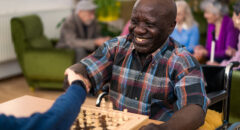
Before your loved one developed Alzheimer's disease, the two of you used to talk about anything and everything. But what do you say now that they can't remember your name?
The right words can be hard to find, but they're more important than ever. Simple, reassuring messages can give your loved one comfort and guidance -- the two things Alzheimer's patients most desperately need.
In Carol Simpson's excellent book "At the Heart of Alzheimer's", she discusses the steps caregivers can take to improve communication with their loved ones. Among her suggestions:
1. Stay positive.
Because of the damage the disease does to the brain, you can bombard an Alzheimer's sufferer with "no" and "don't" all day without changing their behavior. Positive suggestions and simple redirection, however, can work wonders. Instead of chastising them for wandering in the middle of the night, ask, "Wouldn't some rest feel good?" And if they're making a mess in their bedroom, try to divert them by showing them some photo albums in the living room.
2. Offer praise and encouragement whenever you can.
Like all of us, Alzheimer's patients are hurt by negative words and tend to tune them out, but thank-you's and compliments go surprisingly far. If you praise a patient for dressing themself, they are much more likely to do it again tomorrow -- especially if they know how amazing they look.
3. Make directions short, simple, and specific.
Again, the brain damage wrought by Alzheimer's makes it hard for a person to process ideas they would normally understand right away. Rather than asking them to help clean up their room, ask them to pick up their socks and put them in the hamper. Instead of telling them to get ready for bed, tell them it's time to brush their teeth. If the simplest directions don't make sense, you may need to make hand gestures or lead by example. For instance, they may need to see you brush your teeth first.
4. Keep questions simple.
Ask if they would like hamburgers or chicken, not if they have any ideas for dinner.
5. Once is not always enough.
You will have to repeat some instructions and questions over and over again. You're not being ignored. Some things just need to be heard several times before they can sink in. In the early stages of Alzheimer's, you may be able to write instructions down and post them.
RELATED: 9 Tips For Coping With Early Stage Alzheimer’s
6. Keep your voice warm and reassuring.
A harsh, scolding tone will just make your loved one agitated, confused, or distraught. Stay upbeat with them and find another way to vent your frustrations.
7. Get their attention.
If they aren't ready to listen, your words will be wasted. Give them a gentle touch and don't speak until you have eye contact.
8. Speak to them like an adult.
A person who's been around for many decades can be deeply embarrassed or offended by baby talk.
9. Share memories of your earlier life together.
Although people with Alzheimer's may not remember what they had for dinner, they may have remarkably vivid memories of their life decades earlier.
10. Change the subject.
If your loved one becomes upset, try changing the subject, such as asking for help dusting or going for a walk. But, as the Family Caregiver Alliance notes, "It is important to connect with the person on a feeling level, before you redirect. You might say, 'I see you're feeling sad. I'm sorry you're upset. Let's go get something to eat.'"
11. Don't take things personally.
If your loved one remains agitated or makes up outlandish stories (such as "you kidnapped me!"), don't take it personally. They are just trying to express anxieties and make sense of chaos. Look for changes in their environment or daily routine that could be bothering them, gently correct their fanciful ideas, and use soothing words to calm them down.
RELATED: You Are Not Alone! A Message for Black Alzheimer’s Caregivers
12. Listen carefully.
An Alzheimer's patient may not be able to explain their deepest feelings and concerns, but they will give you clues. If they ask about doctor's appointments every day, they may be afraid of exams. Constant references to a lost friend or spouse may be a sign that they are feeling especially lonely. A hug and some quiet talk may help.
13. Try humor.
Some people with Alzheimer's maintain their ability almost until the latest stages of the disease to connect with you on a deep emotional level. Talk with them about your daily life and maintain a sense of humor (just not at your loved one's expense). People with Alzheimer's may be glad to laugh and joke with you.
14. Let them know they're loved.
A woman whose father died of early onset Alzheimer's recalls that even after her father no longer knew her name, he always responded when she told him she loved him. He would beam and say, as he had before he got the disease, "I love you, too, honey." Sometimes he'd just smile and say, "That's right."









